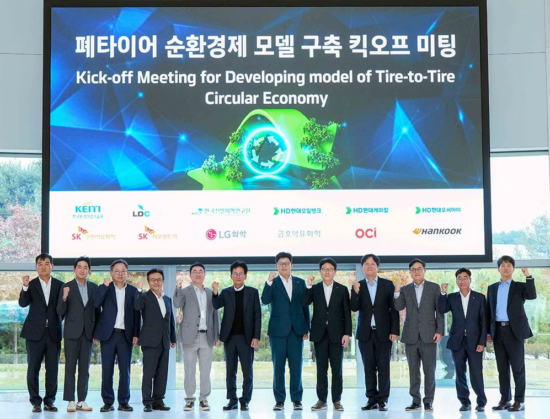Korean firms launch ELT consortium
 A dozen companies have joined the new ELT consortium (Photo: Hankook Tire)
A dozen companies have joined the new ELT consortium (Photo: Hankook Tire)
The inaugural meeting of the Tire-to-Tire Circular Economy Model consortium took place at Hankook Tire & Technology’s Technodome facility in Daejeon, South Korea on 1 November. The Hankook Tire-initiated consortium aims to create a sustainable business model for end-of-life tyres (ELTs) in Korea by “designing innovative upcycling processes” for turning them into new tyres.
Upon introducing the Tire-to-Tire Circular Economy Model, Hankook Tire speaks of a project that “signifies industry commitment to meeting global demands for carbon neutrality and using more sustainable materials in the manufacturing process.” The tyre maker is one of 12 companies and institutes that make up the consortium. The other members are Korea Environmental Industry & Technology Institute, LD Carbon, Korea Institute of Footwear & Leather Technology, HD Hyundai Oilbank, HD Hyundai Chemical, HD Hyundai OCI, SK Incheon Petrochem, SK Geo Centric, LG Chem, Kumho Petrochemical and OCI.
The group members will harness their diverse backgrounds and manufacturing expertise to develop technological solutions for recycling ELTs with a focus on identifying and producing sustainable raw materials that can be used in tyre manufacturing, such as sustainable and recovered carbon black, tyre pyrolysis oil and synthetic rubber. They will further strengthen these efforts by establishing a stable supply chain for sustainable raw materials as well as more intelligent disposal systems. Additionally, the companies intend to seek support in the area of research and development from government ministries and affiliated organisations to accelerate the development of standardised technologies and processes.
Reducing petrochemical reliance
“It is an honour to host such a meaningful consortium,” says Bonhee Ku, chief technology officer of Hankook Tire & Technology. “Our efforts to establishing this model for circular economy of end-of-life tyres will play a vital role in strengthening a more sustainable value chain for the industry, helping replace conventional petrochemical-based raw materials with high-quality secondary raw material.”
Hankook Tire anticipates that the project will help it and other firms reduce reliance on petrochemical resources, helping Korea achieve its CO2 emission reduction goals for the industrial sector (2030 National Determined Contribution, NDC). It also expects that the Tire-to-Tire Circular Economy Model will solidify industrial competitiveness by elevating low-value-added sectors to high-value-added industries.


Comments